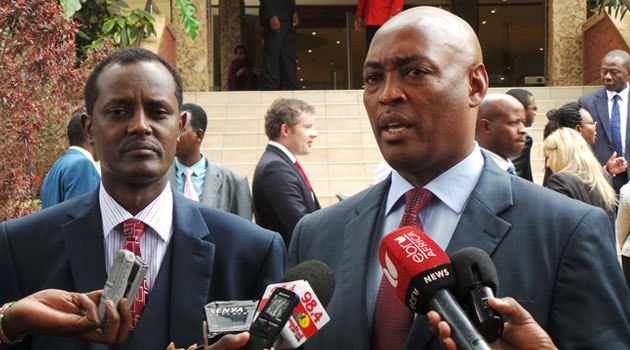
“What we are looking at is strengthening our partnership and building our capacity within the region,” he said. “It is a fight we cannot fight on our own”/MOSES MUOKI
NAIROBI, Kenya, Sep 6 – Director of Criminal Investigations Ndegwa Muhoro on Tuesday called for strengthened cooperation between agencies fighting transnational organised crime at the regional and international level.
He says there is need to enhance the legal capacity to fight the menace more so when it comes to recovery of illegally acquired assets.
“What we are looking at is strengthening our partnership and building our capacity within the region,” he said. “It is a fight we cannot fight on our own.”
He was speaking after launching the 16th Interpol Global Programme on Anti-Corruption, Financial Crime and Asset Recovery, that has brought together officials from 17 countries to Nairobi, among them representatives from the European Union.
During the four-day event, officials from various government agencies among them the Ethics and Anti-Corruption Commission and Stolen Asset Recovery Initiative (StAR) will be trained on the best practices in fighting the vices by Interpol officials.
Muhoro said Interpol was crucial due to its well established infrastructure in terms of the database, “what we call the i247.”
In case an international warrant is issued, such, he said is used to ensure an expeditious and effective arrest of the target person using their database.
“We must strengthen our cooperation and institutions. We are not fighting just some characters in the streets…they have proper muscles,” he cautioned.
If the war on graft can be conquered, Muhoro said, even crimes such as terror and poaching can be wiped out since they are interlinked.
EACC Chief Executive Officer Halakhe Waqo on his part said the bureaucracy within various government agencies has negatively impacted on the war on corruption and organised crime partly due to time consumed in the process.
“It is one of the major reasons why many developing countries have not realised their full development potential,” he said.
He said corruption and other economic crimes must be fought noting that its prevalence remains high.
According to statistics provided by the Global Financial Integrity report 2015, there has been an increase in flow of illicit finances in developing countries, where most African states range.
In sub-Saharan Africa, the report recorded an increase from $66.7 billion to $74.6 billion, Waqo pointed out.
Already there is a progress on regional partnership, after 13 Eastern Africa governments signed the Nairobi Declaration reiterating their commitment to enhance security and justice for all citizens in their respective countries.
The UNODC Programme for 2016-2021 focus on countering transnational organised crime and trafficking such as wildlife crimes, maritime crimes human and drug trafficking.
The African Governments led by Kenya have also committed to countering corruption, terrorism prevention, crime prevention and criminal justice as well as the prevention of drug use, treatment and care of drug use disorders including HIV and AIDS prevention and care.
The UNODC Regional Program for Eastern Africa aims to promote and support effective responses to transnational organised crime and illicit trafficking while strengthening a functional justice system against terrorism to be implemented by member states in accordance with the rule of law.
The program will further contribute to member states meeting the 2030 targets of the Sustainable Development Goals aimed at promoting simultaneously security and development.
According to the Director General of the United Nations Office in Vienna (UNOV), who is also the Executive Director of UNODC, Yuri Fedotov, persistent threats posed by terrorism had greatly contributed to increased incidents of transnational organized crime further complicating the implementation of the rule of law and protection of human life.
Comparing the operations of terror groups in the Sahel, Eastern Africa and the Horn of Africa regions, the Executive Director, UNODC observed that the involvement of terrorist organisations in other criminal activities such as drug trafficking, theft, forging of documents, kidnappings, extortion for protection, fraud and financial crimes transformed terrorism into organised crime.
“There is a blurred border with terrorism and organised crime activities where they merge as one. Whether through benefitting from proceeds of organized crime, receiving material and logistical support, or recruiting and exploiting people, terrorist organizations are benefitting from organized crime activities” Fedotov said on August 29, during the launch of the programme.
The four-year programme wants the Eastern African countries to have an enhanced capacity to undertake effective investigations, prosecution and adjudication of terrorism related offences in conformity with the rule of law and human rights.
Among the issues identified during the launch for providing fertile grounds for the crimes include continued political and economic instability among several Eastern African countries.








































